
西班牙Can Batlló视听媒体学校 / JAASEMAV Can Batlló / JAAS由专筑网沈17,小R编译来自建筑事务所的描述。始建于1878年的Can Batlló位于Can Mangala场地上,与巴塞罗那共同拥有着悠久的发展和历史。城市的工业全盛期见证了综合体的扩张和新建筑物拔地而起。随着时间流逝,然而,这些建筑被废弃不再使用。最近,社区发起倡议重新利用这些很大程度上的废弃结构。这个项目规划为一所媒体学校所用,位于建筑群的第七区,能够很好地让Can Batlló面向Gran Vía乃至更加广泛的公众区域所开放,在这个项目中,巴塞罗那的建筑师决心要尊重建筑遗产,保持其原始的类型特征,并使附加部分减少对原本结构的影响。Text description provided by the architects. Built in 1878 on the plots of Can Mangala, the Can Batlló compound shares a long history of growth and transformation with Barcelona. The city’s industrial heyday saw the complex expand and new buildings rise. Over time, however, these fell into disuse, culminating in a recent community-led initiative to repurpose the largely abandoned structures. This project, which develops the programme for a media school in the compound′s 7th nave, is the cornerstone of a larger effort to open Can Batlló to the Gran Vía and the greater public. In approaching this project, the Barcelona-based architect vowed to respect the architectural heritage of the building, maintain its original typological traits and make their additions completely reversible.


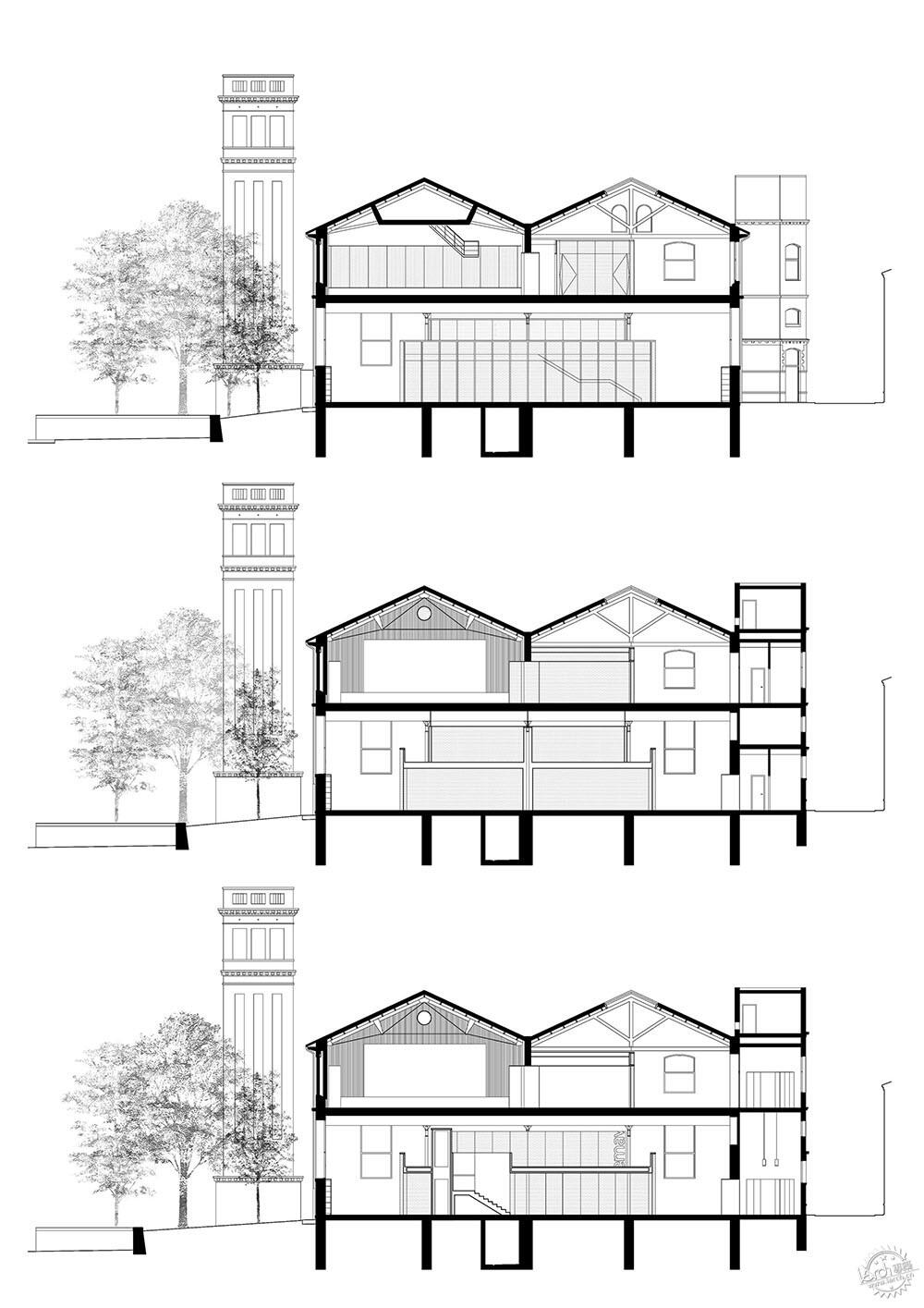
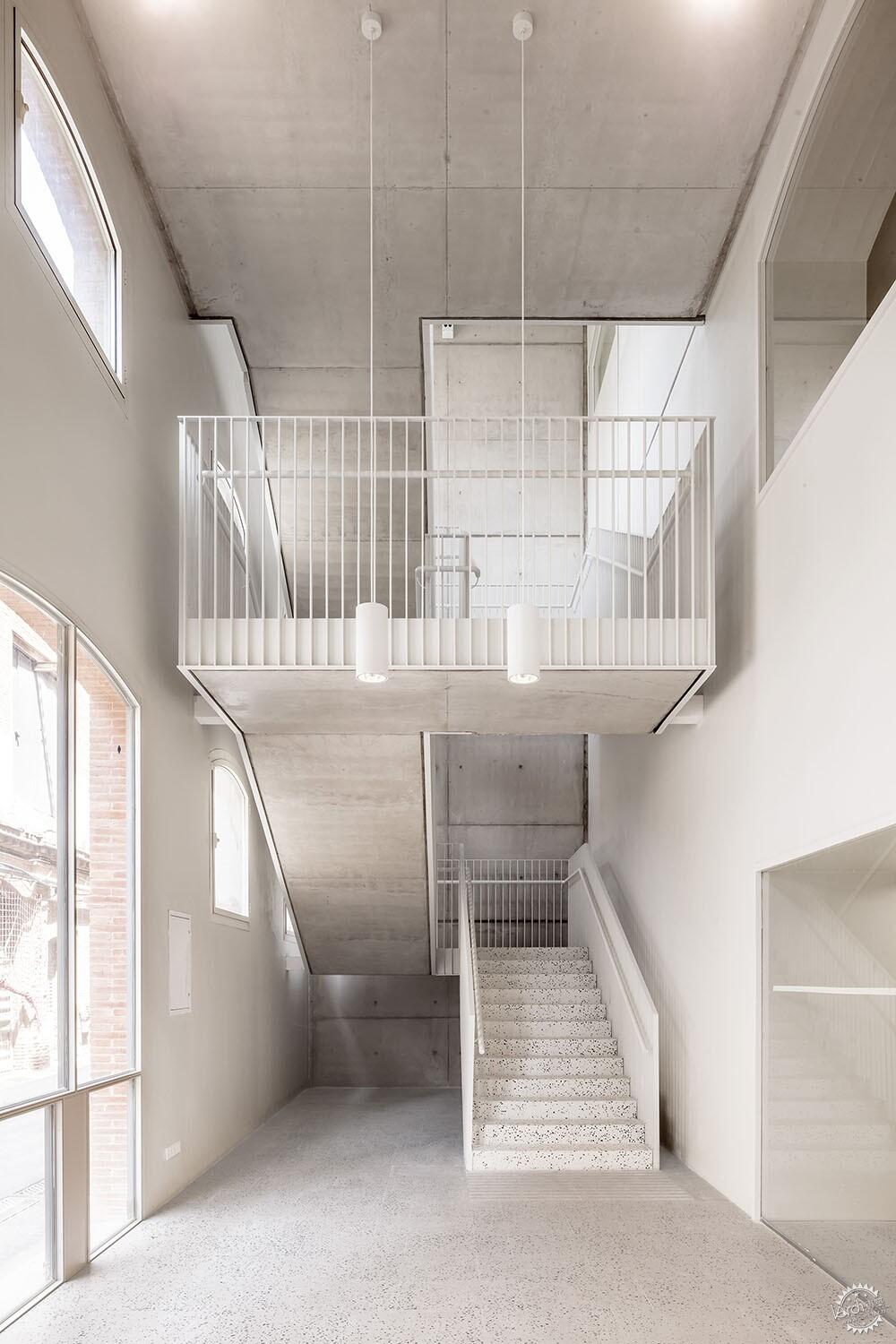
这些决心奠定了学校的布局,也决定了其和现存中央广场连系的方式。在首层,例如,对模数化的柱式结构进行了调整,使之转化成一系列教室。另一方面,一层的桁架更宽敞,拥有更开放的空间,这里也正是宽大的设施所在。同样地,项目充分利用了首层的高度,在这里设置了两层高的中心结构。在一层,中心结构区分了教室空间,在二层,则形成了行政办公室。当更低的楼层基本上是内向视野的时候,使用者在高层则可以欣赏到Gran Vía和Can Batlló公园的全景。该结构的布置策略包含接待处、媒体图书馆和学生储物柜的周边区域组织起来。一层也设有相似的结构。项目本身就设有广播室、练习室、更衣室和摄影工作室。然而,因它仅占用了半个中庭,也同样创造了一个开放空间,可以有选择地用作门厅、学生的工作区域或者是展览画廊。二层与之相反,容纳了电视、剧场和电影院。所有这些功能空间需要很大的结构跨度以及一定的隔声。放在首层和一楼的两个结构都是独立的,并且完全可逆的。These commitments undergird the layout of the school and govern how it interacts with the preexisting features of the nave. In the ground floor, for instance, the modular pillar structure was adapted and reconverted into a series ofrooms. The trusses of the first floor, on the other hand, lend themselves to wider and more open spaces. It is here that the more spacious facilities are located. The project, likewise, takes full advantage of the ground floor’s height, where a two-storied central structure has been installed. On its first level, this piece houses therooms, and, on the second, the administrative offices. While the lower level is fundamentally inward-looking, the upper one boasts commanding views of the Gran Vía and the Can Batlló Park. The structure’s strategic location, in turn, organizes the surrounding areas, which include a reception, a media library and student lockers. A similar structure was installed on the first floor. The piece itself houses radio booths, practice rooms, changing rooms and photography studios. However, since it occupies only half a bay, it also generates an open area that can be alternately used as a foyer, a working area for students or as an exhibition gallery. The floor’s second bay, in contrast, is home to a TV set, a theater and a cinema. All of these require large structural spans and absolute acoustic insulation. Both of the structures placed on the ground and first floor are free standing and completely reversible pieces.

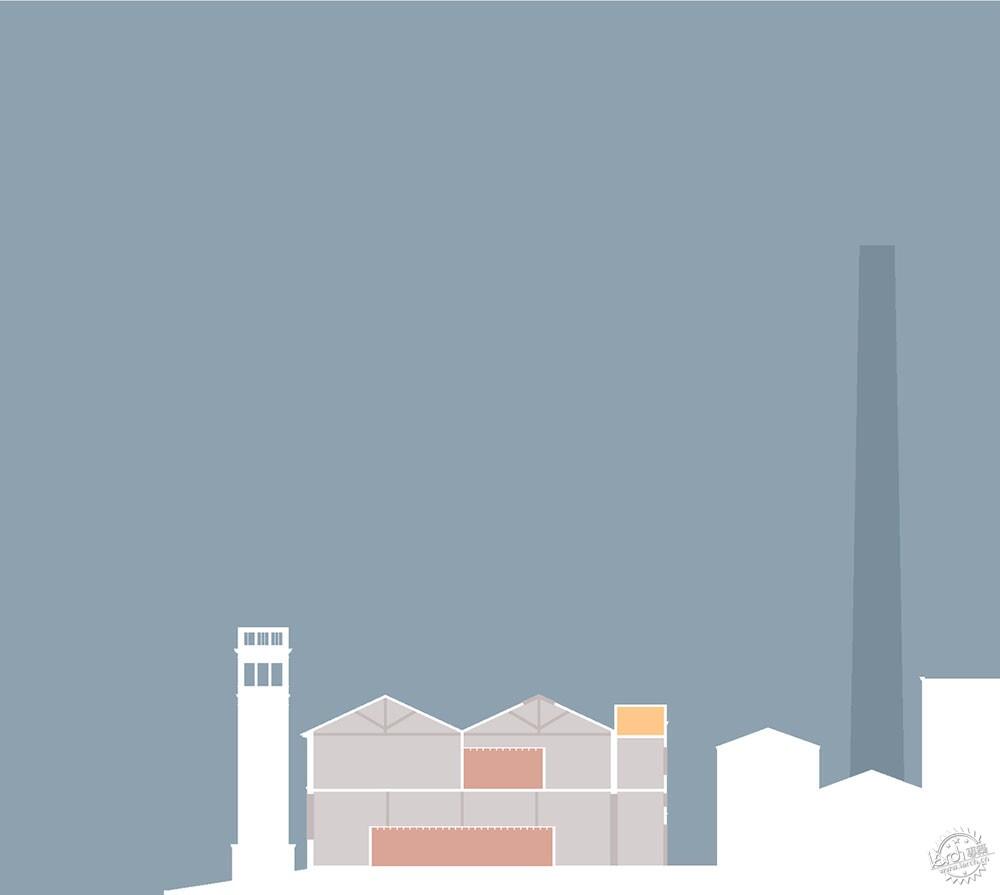

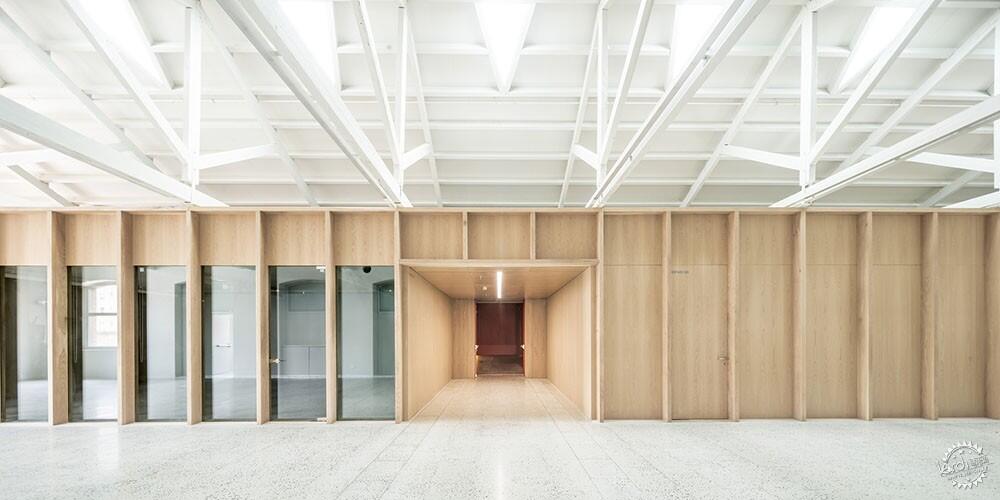
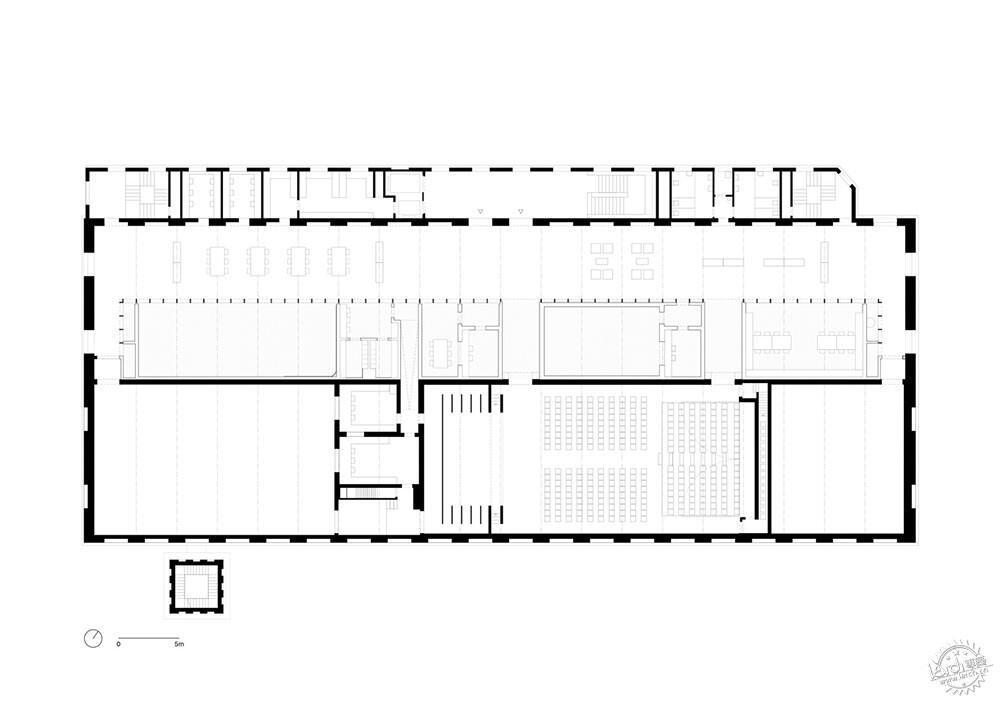
这样一来,它们就和中央广场区分了开来。并且通过这样的做法,使用者可以清晰地看到旧空间与新空间的区别,同样的策略可以在建筑师对立面的处理中看出来。通过合并残破和损坏的残骸,它们表达了建筑的各个历史阶段,例如,在当前建筑一层的填充孔处就有所暗示,中央大厅有着新功能。在其他方面,建筑师试图致敬建筑的工业历史,重塑原始的类型特征:有序、重复和简洁。实际上,正是秉承这些原则,在新的内部结构四周均匀放置了一系列木片。从远处看,它们保证了完全的隐私,但在近处看是完全透明的。最后,为强调开口,建筑师设计了高可见度的华丽屋顶和一座倾斜的花园,二者均面向Gran Vía。As such, they stand apart from the nave, and, in so doing, offer readings of the space in which the old is clearly differentiated from the new. This same attitude also informs the architects’ treatment of the façades. By incorporating broken and deteriorated pieces that have been salvaged, they bear testament to the building’s history and its various phases of construction. Its current facet, for example, is intimated through the in-filled apertures of the first floor, which suggest that the nave has been given a new use. In other cases, the architects sought to pay homage to the building’s industrial past, recreating its original typological traits: order, repetition, and simplicity. Indeed, it is in keeping with these principles, that a series of wooden fins were placed around the new, inner structures. From afar, these guarantee total privacy but are fully transparent from up close. Finally, to consolidate the compound’s aperture, the building was finished off with a highly visible ornate roof – treated as a fifth façade – and a sloped garden, both of which face the Gran Vía.
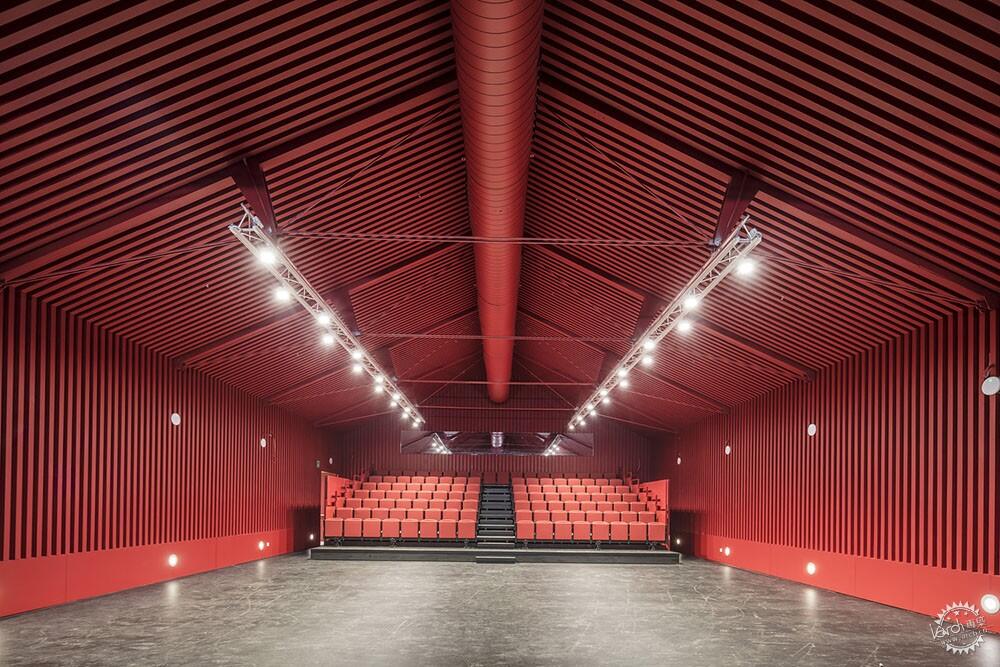








建筑事务所:JAAS类型:初级学校&中级学校面积:7611 m2年份:2019年摄影:Adrià Goula制造商:AutoDesk, Erco主创建筑师:Josep M. Julià i Capdevila设计团队:Jordi Gorgues, Alfons Güell, Aina de Montserrat委托人:Consorci de l’Educació de Barcelona工程:TDI Enginyers顾问:AT3 Oller Peña合作伙伴:Jordi Payola国家:西班牙ELEMENTARY & MIDDLE SCHOOL, SPAINArchitects: JAASArea: 7611 m2Year: 2019Photographs: Adrià GoulaManufacturers: AutoDesk, ErcoLead Architects: Josep M. Julià i CapdevilaDesign Team: Jordi Gorgues, Alfons Güell, Aina de MontserratClients: Consorci de l’Educació de BarcelonaEngineering: TDI EnginyersConsultants: AT3 Oller PeñaCollaborators: Jordi PayolaCountry: Spain